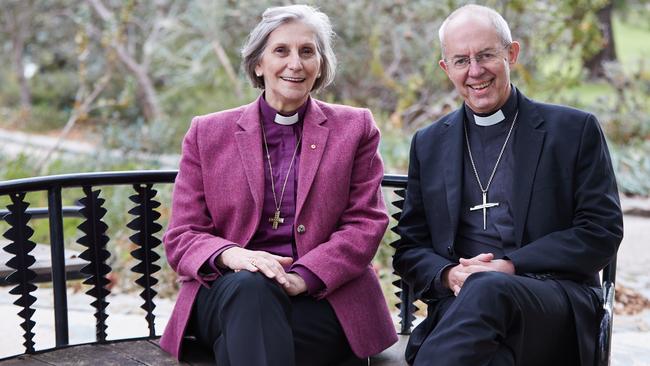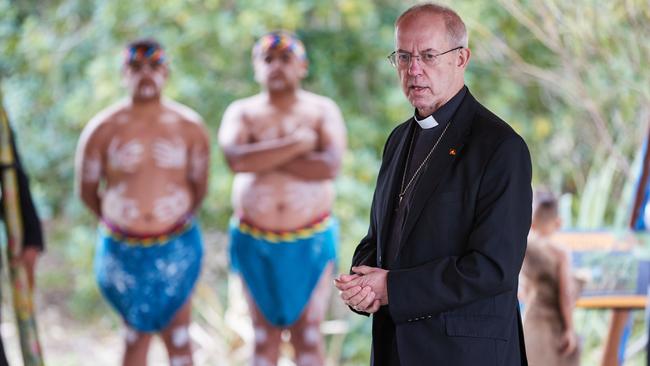Archbishop of Canterbury warns cancel culture ‘hurting human dignity’
The world’s most influential Anglican has warned that cancel culture threatens religious freedom and undermines “common concern” for human dignity.

The world’s most influential Anglican has warned that cancel culture threatens religious freedom and undermines “common concern” for human dignity.
Archbishop of Canterbury Justin Welby spoke out after launching his first national tour of Australia, amid widening criticism that short-lived Essendon Football Club chief executive Andrew Thorburn was hounded out over his role in an evangelical church in Melbourne.
While steering clear of the row – “the last thing any wise Australian wants is a late middle-aged foreign cleric lecturing them”, he said – Dr Welby said secularised Western societies had lost the ability to “disagree well”.
“We have not found a way of disagreeing without exclusion, without cancelling people,” he said. “We are just in a place where since there is no one authority, we seem to be going to no authority at all – even the authority of a common concern for each other’s dignity and for freedom of religion and belief.
“We invariably end up setting one group’s rights against another group’s rights.”
The former NAB bank boss’s resignation from Essendon this week, only 30 hours after being appointed CEO, was forced by revelations that the Anglican-aligned City on a Hill church that he helped run had posted a 2013 sermon on its website branding homosexuality a sin and likening abortion to concentration camp deaths.
Despite dissociating himself from the claims, Mr Thorburn faced withering criticism from Victorian Premier Daniel Andrews and quit the Bombers on Wednesday after the board decided he had to choose between his new job at Windy Hill and position as chairman of City on a Hill.

Mr Thorburn said this week that his “personal Christian faith is not tolerated or permitted in the public square”, complaining that society was the poorer for the “loss of our great freedoms of thought, conscience and belief”.
“People should be able to hold different views on complex personal and moral matters and be able to live and work together, even with those differences and always with respect,” he said.
His comments were echoed by Anglican Archbishop of Melbourne Philip Freier, who said it would be unfortunate “if people of faith are sidelined from participation in professional and public life on account of personal and religious belief”.
Asked if the voice of religion was being silenced, Dr Welby said: “Freedom of speech, freedom of religion and belief and non-belief is an essential for any society to live well together. But it has to be negotiated. You have to find a way of doing that in a way that does not result in people (saying), ‘you know, if you belong to X organisation you can’t do Y.’ That just is not how a society should function.
“Very few of us always agree with ourselves, let alone always agree with an organisation to which we belong. If that is not managed, it leads to society consisting of a whole bunch of small groups all of which are convinced they are persecuted minorities.”
The English church leader’s visit comes at a trying time for the Anglican Church of Australia, facing a walkout by mainly evangelical conservatives who don’t accept same-sex marriage or the ordination of women priests beyond the entry-level rank of deacon.
A second chapter of the breakaway Diocese of the Southern Cross was set up in Queensland this week, kicking along speculation that more defections were on the way.
Dr Welby appealed to the would-be separatists to stay. “I would say to those people, stick with it, stick in, stay with the church,” he said. “Don’t go off … because you damage the witness of the church. Disagree vehemently, but lovingly.”

He was “saddened and disappointed” by the refusal of the nation’s largest and richest division, the deeply conservative Diocese of Sydney, to recognise the Australian church’s most senior female leader, Archbishop of Perth Kay Goldsworthy.
Speaking from her residence, where he was hosted during the opening leg of his tour, Dr Welby said: “We just have to work our way steadily forward with this, and of course it’s hurtful to her and other women who believe themselves called and who the church has recognised as called.”
The issue of same-sex unions also split the church in the US and New Zealand, provoking a showdown at the general synod on the Gold Coast in May where the Sydney-led conservatives failed to enshrine marriage in the Anglican constitution as being exclusively between man and woman.
Dr Welby insisted, however, that the bitter theological dispute did not represent anything like an existential threat to the 85 million-strong Anglican communion worldwide.
The “average Anglican” was a woman in her 30s in sub-Sahara Africa who had a 50-50 chance of living in either a zone of conflict or immediate post-conflict or being otherwise persecuted, he said. “I can assure you that woman is not going home in the evening, saying to her husband: ‘I am really worried about the issue of same-sex marriage’.”
After attending a forum of 500 rank and file Anglicans in Adelaide on Friday, Dr Welby is due to move on to Melbourne on Sunday, Sydney next Tuesday, Ballina and Grafton in northern NSW on Wednesday, followed by stops in Far North Queensland in Cairns and Thursday Island.








To join the conversation, please log in. Don't have an account? Register
Join the conversation, you are commenting as Logout